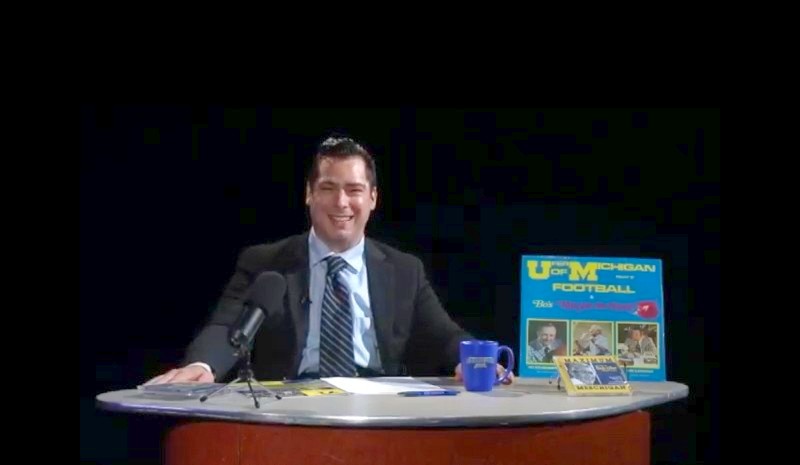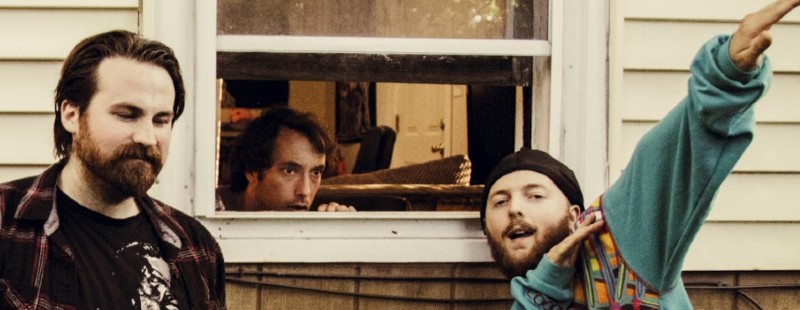The short documentaries "Boogie Woogie Express" and "Mr. B's Joybox Express" showcase Michigan piano titans

On the surface, Boogie Woogie Express is a short film about piano player Bob Seeley, who was born in Detroit in 1928. But at 11-minutes long, there's not a ton of room for biography in this movie by Ypsilanti filmmaker Donald Harrison of 7CylindersStudio—yet it's the perfect amount of time for a quick and fun primer on the art of boogie-woogie piano. It's especially interesting to hear and see how boogie-woogie evolved into rock 'n' roll, with Seeley demonstrating the rhythmic differences between the two styles.
Shot in 16mm black and white film, Boogie Woogie Express premiered in 2007 at the Detroit Docs International Film Festival and on YouTube on February 1, 2022.
Because boogie-woogie piano is a niche community, it's no surprise that Seeley has performed with Ann Arbor's Mark "Mr. B" Braun on numerous occasions; the twosome even made a concert film together in 2009 called Back to Back Live. Both were heavily influenced by boogie-woogie giant Meade Lux Lewis and the duo covered his "Honky Tonk Train Blues" in the concert film.
Boogie Woogie Express is embedded below, along with a couple of videos of Seely and Braun performing together on a single piano—back to back, cheek to cheek—and Mr. B's Joybox Express, a 15-minute documentary from 2017 on Mr. B.
Talk, Talk, Talk: Zach Damon's "Ann Arbor Tonight" puts a local spin on the late-night TV chat format

At age 6, Zach Damon discovered his love of public speaking.
The future Ann Arbor Tonight host-producer was an ambassador for March of Dimes and spoke at different events in the early ‘90s, including the National Athletic Awards at Detroit’s Fox Theatre.
“I remember being in the audience because it was a pre-taped show and seeing the great energy and the great camaraderie of the business in general,” said Damon, who was born with cerebral palsy and grew up in Ann Arbor. “Everyone was so encouraging, and they’d say, ‘Zach, you can do anything you want to do, and if you want to work in media one day, then you can do that.’”
Damon also became inspired watching TV sportscaster Greg Gumbel and author-journalist Mitch Albom serve as hosts of the awards show. In that moment, he found his purpose.
“I remember seeing one of the broadcasters on stage doing his thing, getting the cues during the show, and then presenting," he said. "I remember at one point looking at the stage and saying to myself as a 5 or 6-year-old … I’d really like to be that person … and that’s where I felt most comfortable.”
Damon carried that dream with him throughout his teen years. By his junior year at Ann Arbor’s Pioneer High School, he aspired to host a late-night talk show.
“I was talking to some buddies of mine who were in the film and video club, and I said, ‘It would be really neat to have a late-night show in Ann Arbor and call it Ann Arbor Tonight,” said Damon, who’s inspired by The Tonight Show and Saturday Night Live. “I was sitting on my bed, and they were like, ‘Yeah, whatever, Zach.’ I always have these very big ideas, but I really felt that they were possible if you just put the action toward it.”
AADL 2021 Staff Picks: Homepage

This is the fifth year we've compiled Ann Arbor District Library staff picks, featuring tons of recommendations for books, films, TV shows, video games, websites, apps, and more.
The picks are always an epic compilation of good taste, and last year's post was more than 35,000 words—incinerating phone data plans and overheating computers as the massive page loaded.
In a sincere effort to keep your electronics from catching fire, we've split up the hundreds of selections into four categories:
➥ AADL 2021 Staff Picks: Words
➥ AADL 2021 Staff Picks: Screens
➥ AADL 2021 Staff Picks: Audio
➥ AADL 2021 Staff Picks: Pulp Life
And since we've saved your phones and laptops from the flames, tell us what you enjoyed this past year in the comments section below—doesn't need to be something that came out in 2021, just some kind of art, culture, or entertainment that you experienced over the prior 12 months.
AADL 2021 Staff Picks: Screens

➥ AADL 2021 Staff Picks: Homepage
➥ AADL 2021 Staff Picks: Words
➥ AADL 2021 Staff Picks: Audio
➥ AADL 2021 Staff Picks: Pulp Life
AADL 2021 STAFF PICS: SCREENS
TV, movies, DVDs, YouTube, streaming, etc.:
UMMA's "Claim Your Space" campaign encourages people to find their place at the museum

Ostensibly, the "Claim Your Space" promo video was made to highlight the University of Michigan Museum of Art's extending its Thursday through Sunday hours starting Sept. 7 and a new effort to attract people to the building.
But the video isn't just an ad for UMMA; it's a work of art that stands by itself and shows off the immense creative talent of the U-M students who made it.
"Whip" It: Nadim Azzam's new YouTube show cruises with Michigan musicians

[This story was originally published on December 9, 2020. The entire first season is out now on YouTube and the show is having a concert at The Blind Pig on Saturday, September 11 featuring everyone who has appeared in the series so far: Dani Darling, Pariis Noel, D. Vaughn the Illest, Mirror Monster, KI5, and host Nadim Azzam.]
Artists performing songs being driven around in a car by a congenial host. Sound familiar?
But Whip Jams isn't Carpool Karaoke.
Host Nadim Azzam doesn't fuss around with wacky comedy. He gets right to the point with his guests, reciting a short bio, picking the musician up in his car, letting them perform, and concluding with a brief interview.
The first episode of this YouTube show clocks in at 4 minutes, 57 seconds. A quick ride indeed.
In the Whip Jams debut on December 9, Ann Arbor's Ki5 performs a song in Azzam's vehicle by sampling his voice with the Boss RC-505 Loopstation sitting in his lap. That kind of compact setup works fine for him, but some future episodes will feature artists holding acoustic instruments—might get a little cozy in Azzam's Honda Civic.
Ann Arbor Film Festival launches a virtual version of the 59th edition

Like 60-degree days in March, the 59th Ann Arbor Film Festival snuck up on us this year and we didn't get a chance to screen any of the movies before the event launches Tuesday, March 23.
But here all the pertinent details to get you started on this year's edition:
Aw, Yeah: Ypsi-filmed YouTube show "Renting and Raving" offers silly humor and strong characters

The first time Basement Guy ate real cat food was the last time.
"Next few instances he was eating chili in a cat-food can," says Evan Greig, the director, co-writer, and co-star of Renting and Raving, a YouTube comedy show shot in Ypsilanti. "The fact that a lot of people find the cat-food scene to be gross is great. To me, it means we made it feel real—because it was."
"I remember we were shooting that night and the plan was to empty the can out and fill it with tuna," says Eric Pullins who co-stars as Bret and is a co-writer, prop master, and production designer for the show. "[B]efore we could do that Cameron just dove right in. Cameron is our star and he really commits. I would not have committed that hard."
The committable Basement Guy is played by the committed Cameron Greig, who is also a co-writer and key grip on the show.
This trio of characters comprises the core of Renting and Raving, which makes up with oodles of charm and smart-to-low-brow humor what it's missing in a budget and the occasional incongruity.
All 10 episodes of the first season, filmed before the pandemic, are now available on YouTube, and it's a labor of love for Greig, Pullins, and Greig, along with cinematographer Johannes Pardi, production manager Emily Weir, script supervisor Brent Bergeron, who also plays Evan's shady pal Tito on the show. Also, the brief but ear-worm-worthy theme song by Jeremiah Heiss will get stuck in your head and have you mumbling "Aw, yeah!" to no one in particular.
AADL 2020 STAFF PICKS: BOOKS, MUSIC, MOVIES & MORE

Normally, you might come into the library, talk to someone on staff, get some recommendations, perhaps share a few of your own, and we'd go on our merry ways, content we could engage in a positive social interaction while discussing whatever book, movie, TV show, music, or more that came up.
Art is life and life is people.
But we've not seen most of you since March 13, the last time the Ann Arbor District Library was fully open to the public—and to the staff. While many AADL staffers have returned to the buildings to do important behind-the-scenes work since the summer, many others have been working from home since the closure. And we miss being able to share what we're currently loving not just with patrons but also with each other.
So, to staffers and patrons alike, these are the movies, TV shows, music, books, and more that helped the AADL crew get through 2020.
Inna De Yard: Ann Arbor's Evan Haywood directs a music video for Jamaica's Israel Voice

Longtime Ann Arbor creative Evan Haywood is known for his solo work as a singer-songwriter and as one of the voices in the Tree City hip-hop collective.
He's about to add filmmaker to his resume after traveling around Jamaica in May 2019 to film Blood & Fire, "a documentary on anti-colonial narratives in Jamaican music and culture," Haywood said, with one of the biggest stars in the movie being Lee "Scratch" Perry, reggae's eccentric genius. Haywood is still editing the film, but while in Jamaica, he also shot footage for several music videos, one of which has just debuted: Israel Voice's "Nyomi," which features the sweet-voiced veteran crooner looking for spiritual love; the roots-reggae tune was co-produced by Earl "Chinna" Smith. Haywood filmed part of the video at Chinna's yard as well as the surfing hot spot Bull Bay.
We asked Haywood about the making of the video, so he wrote a narrative on the process and also updated us on the other music videos he has planned and where he's at with Blood & Fire.


































